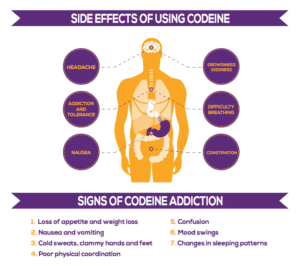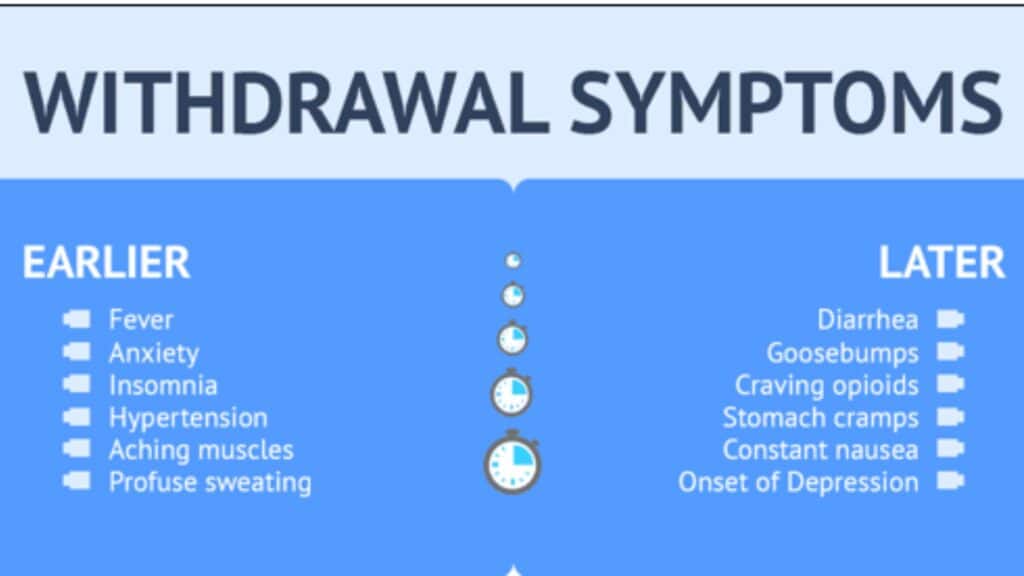If you have clicked on this blog then we are sure you are searching for codeine withdrawal symptoms. Codeine is widely prescribed for pain, persistent cough, diarrhea, and sleeplessness. However, abuse of codeine often leads to codeine addiction. When an individual tries to quit codeine, they have to deal with nasty codeine withdrawal symptoms.
In such circumstances, overcoming codeine addiction can be quite challenging. The first step to overcoming codeine addiction is to be aware of codeine withdrawal symptoms. In this blog, we have compiled knowledge about codeine withdrawal symptoms and their causes and how to manage these symptoms.
What is codeine?
Broadly speaking, codeine is a type of opioid and a prescription drug and is manufactured by harvesting the poppy plant. Codeine is prescribed for pain, persistent cough, diarrhea, and sleeplessness. Therefore, users of codeine exercise caution must take this drug only with a prescription and adhere to the advice from a medical professional while taking this drug.
Given that codeine belongs to a class of narcotic opiates, it has the potential to become an addiction. Once an individual becomes dependent or addicted to codeine, they may face codeine withdrawal symptoms to stop the use of this drug.
What are the codeine withdrawal symptoms?

An individual may develop codeine tolerance even if they take codeine on the advice of a certified medical professional and stick to the prescribed frequency and dosage while taking the drug. While codeine is generally prescribed by doctors as a painkiller and a sleeping pill, there is a chance of an individual developing codeine tolerance. After stopping the use of codeine, individuals might have to go through codeine withdrawal symptoms.
Codeine withdrawal symptoms can be felt when the body is craving another dose of the drug. When an individual is addicted to codeine, their body starts craving the drug after regular intervals. If the drug is not administered to the body, they start feeling unpleasant withdrawal symptoms.
There are 2 stages of codeine withdrawal symptoms. The first phase of the withdrawal symptoms is typically felt after a few hours of the last dose. The second phase occurs when the body tries to function without codeine in the system.
The following are the codeine withdrawal symptoms that are felt during the first phase:
- Feeling of irritability
- Anxiety
- Sleeplessness
- Sensitive eyes
- Flu-like symptoms
- Excessive perspiration
- Soreness of muscles
- Increase in heart rate
On the other hand, codeine withdrawal symptoms can look something like the following during the second phase:
- Loss of appetite
- Stomach pains
- Nausea
- Vomiting
- Dilated pupils
- Diarrhea
- Unnatural chills or goosebumps all over the body
It is pertinent to note that an individual may feel only some of these symptoms while some individuals might face all of these symptoms at once. Codeine withdrawal symptoms differ from individual to individual.
What causes codeine withdrawal symptoms?

The primary cause of withdrawal symptoms is dependency. When an individual starts taking an addictive and habit-forming drug like codeine, their body becomes accustomed to functioning with codeine in the system. After a while, their brain develops a psychological dependency to function normally only with codeine in the system. Once their body stops getting the usual amount of codeine, they start suffering from various codeine withdrawal symptoms.
In the case of codeine addictions, an individual is bound to suffer from withdrawal symptoms as their body starts to get rid of the toxic substances and chemical compounds from the drug. This results in intense withdrawal symptoms as the brain cannot function normally without codeine and the body is trying to detoxify itself.
Hence, codeine withdrawal symptoms are a result of depriving the drug that it has grown habitual to. Primarily, there are 3 causes of codeine withdrawal symptoms: tolerance, dependency, and addiction. Let us discuss each cause in detail.
Codeine Tolerance
Codeine tolerance is a common cause of symptoms of codeine withdrawal. Codeine tolerance can occur when an individual abuses codeine and uses this drug as a means of recreation. They start taking this drug without a valid prescription from a certified medical professional.
In such circumstances, over time, codeine tolerance can be developed. Codeine tolerance means that lower doses will no longer be affected on an individual. To feel the same amount of effects, an individual will now need higher doses of codeine.
Codeine tolerance is dependent on several factors such as genetics and the duration, frequency, and dosage of the drug.
Codeine Dependence
Codeine dependence is a result of codeine tolerance. This means that since an individual’s body has become tolerant to codeine, their body starts craving codeine after regular intervals to avoid suffering from symptoms of codeine withdrawal.
In cases of codeine dependence, the withdrawal symptoms are quite nasty and intense. This is exaggerated when the use of codeine is stopped abruptly. Codeine dependence is common in cases where an individual arbitrarily takes this drug and exceeds the dosage or duration of taking this drug.
It is crucial to understand that codeine addiction and codeine dependence are different from each other. Codeine dependence can be developed even when an individual is taking this drug strictly with a valid prescription and after advice from a medical professional.
Codeine Addiction
Codeine addiction is different from codeine dependence. Broadly speaking, once an individual stops the use of codeine, they might feel symptoms of withdrawal both in cases of addiction and dependency.
Having said that, it is important to understand that codeine dependence is due to a prolonged use of this drug. Dependence can occur even when an individual uses this drug for treatment and on the advice of their doctor.
However, addiction is the next stage of dependence. A person who is addicted to codeine will crave the drug and indulge in many problematic behaviors to locate that drug. Addiction is hazardous as it can permanently alter the brain’s chemical composition. A person who is addicted to codeine will have no control over the use of codeine. They might find it difficult to cease using codeine and may require medical assistance to do so.
How long do the codeine withdrawal symptoms last?

Typically, symptoms of codeine withdrawal last for a week. However, some symptoms may last for several months in cases where an individual has been abusing codeine for a long time.
Physical symptoms of codeine withdrawal like nausea, vomiting, perspiration, etc. are quite strong for the first few days since the use of this drug is stopped. Milder symptoms of codeine withdrawal can be felt for up to 2 weeks.
Having said that, behavioral symptoms of codeine withdrawal like irritability, anxiety, panic attacks, etc. can last for several months. In severe cases, these symptoms can even last for a few years.
This is because every individual reacts differently to codeine. Since everyone’s system is different, they may experience different withdrawal symptoms as well.
How to manage codeine withdrawal symptoms?
There are several ways to manage withdrawal symptoms of codeine. If you have strictly been using this drug on the advice of your doctor, they will be able to assist you with managing your withdrawal symptoms. In cases where there is a prolonged use of codeine, the doctor may reduce the dose of codeine instead of abruptly stopping the doses. This helps in minimizing the withdrawal symptoms as much as possible.
Additionally, a certified medical professional may also prescribe medicines to manage the physical side effects of codeine withdrawal like nausea, headache, diarrhea, vomiting, etc. Practices like meditation, mindfulness, and therapies like cognitive behavioral therapy (CBT), interpersonal therapy (IPT) and motivational enhancement therapy help manage the psychological side effects of codeine withdrawal like depression, anxiety, panic attacks, etc.
Frequently Asked Questions
1. How to prevent codeine withdrawal symptoms?
Withdrawal symptoms from codeine can successfully be prevented by strictly adhering to the doctor’s advice while taking codeine. Additionally, medical detox programs, exercise, a balanced and nutritious diet, hydration, and a regular sleep schedule help in managing the withdrawal symptoms of codeine.
2. What are some of the first codeine withdrawal symptoms?
The early symptoms of codeine withdrawal include a feeling of irritability, anxiety, sleeplessness, sensitivity in the eyes, symptoms that resemble flu, excessive perspiration, soreness in muscles, and an increase in heart rate.
3. What causes codeine withdrawal symptoms?
Codeine withdrawal symptoms are caused by codeine dependency, codeine tolerance, and codeine addiction. Withdrawal symptoms of codeine are aggravated when the body gets habitual of having a certain level of this drug in the body to function normally.
4. What is the difference between codeine tolerance, codeine dependence, and codeine addiction?
Tolerance to codeine develops when the body requires higher doses of the drug to be effective. Regular use of codeine leads to the development of tolerance. Even when used as prescribed, codeine can cause dependence. Codeine addiction is a severe condition where individuals experience intense cravings for the drug and may resort to extreme measures to obtain it.
5. What is codeine used for?
Codeine is used to alleviate mild to severe pain, and symptoms of problems relating to the digestive system like diarrhea, sleeplessness, and cough. Due to its addictive nature, codeine is prescribed by a certified medical professional.
Conclusion
Despite codeine being a prescription drug, codeine is being misused by several people today. Codeine addiction is a serious issue and addiction to codeine can hamper an individual’s health for the long term.
Even if an individual takes codeine strictly with a prescription and the advice of a doctor, they can develop a dependence on codeine. This is because codeine is a potent drug that alters the chemical composition of the brain.
Once addicted, it is difficult to quit and face codeine withdrawal symptoms. Just like there are good and evil sides to everything, codeine is no exception. As long as the use is bonafide, codeine will not cause any harm.











